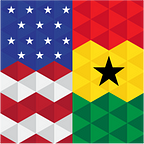Holding Ghana’s Future in Your Hands
By Ambassador Gene A. Cretz
I recently visited Takoradi and wanted to share how impressed I was to see so many young people taking matters into their own hands and really working hard to acquire marketable skills that will serve them in lifelong careers. I’m proud that through a variety of American partners, Ghanaians reap the benefits of our long-standing friendship.
I was pleased to see education playing a practical, important role in shaping careers of Ghana’s youth. We started out paying a call on the Sekondi Nurses and Midwifery college. Perhaps there is no greater responsibility in this world than bringing forth new life through the birthing process. Noticing the strong confidence that the students at the college exhibited, I was curious to know these hard-working women had gained so much confidence. The answer was practice, practice, practice and more practice. American foreign assistance dollars are well-spent on training programs like these that meet international training standards. Before ever assisting with actual births, these students had the opportunity to practice their coursework over and over through simulation. Clearly, with courses like these students are being prepared to mold a brighter future for Ghana.
I also had the opportunity to visit the Takoradi Polytechnic and saw first-hand how machinery, engineering and safety operations are being taught, again with ample hands-on opportunities an important component of instruction. It was easy to see American know-how being productively embraced and implemented as I talked to an alumnus of the Community College Initiative and recent Polytechnic graduate and met the Vice Principal of the Takoradi Technical Institute which hosts the 10-year-old MIT FabLab. The application of American know-how was also evident as I toured the impressive Jubilee Partner’s Technical Training Centre. Given the expected expansion of the oil and gas industry in the region, it is reassuring to know that so many students are investing in their futures and obtaining the skills necessary to be able to fill the jobs that will accompany that expansion.
We also travelled to the Sekondi Naval base to learn about the ongoing comprehensive cooperation and training between Ghana and the United States. Maritime security has been a core objective of our military collaboration, and this base was a prime location to see how various law enforcement units connect with each other. From the Marine Police to Fisheries Commission professionals, communication and cooperation are critical. Stakeholders in maritime security collaborate on communication and analysis training in order to better understand their respective roles and alternative reporting techniques as well as to improve execution.
Nothing demonstrated the fact that opportunities exist for Ghanaians willing to study the market and take risks as clearly as our visit to Zeal Enterprises. This company employs over 170 Ghanaians, serving future generations of Ghanaians by protecting the environment and responsibly processing oil industry waste products.
The next stop of my visit was a meeting with Deputy Regional Minister Gyan who kindly welcomed us and shared some of the region’s priorities. While welcoming our visit and American private investment, it became clear that this region views infrastructure development as critical to facilitating both Ghanaian and global business growth. My meeting with the Deputy Minister provided excellent context for my subsequent meeting with civil society and fisheries representatives to hear their hopes and concerns for their community. We had a frank discussion about everything from sex trafficking to depleting fishery stocks, to education to the cost of living.
As I learned of progress at the Jubilee Partner’s offshore storage and drilling installations I also learned of ways that American companies are addressing some of the concerns raised by the Deputy Minister and the civil society and fisheries representatives with whom I had just met. And I came away more convinced than ever that American companies by-and-large stand out as models of corporate social responsibility.
I was heartened to hear how Kosmos and about half a dozen American companies are working with Safe Water Network to sustainably improve access to water to over 100,000 people in Ghana. In Atuabo the machinery and water towers are bringing clean water to 10 communities at low cost. Kosmos gives particular importance to what they term local, local content. I was pleased to learn that they not only share their business acumen with civil society partners, but with organizations like the Ankobra Fish Smokers Association. Not only does this organization of women entrepreneurs now have safer stoves to smoke the incoming fish, but they now have a meeting room and are learning techniques to maximize profits in high and low seasons respectively.
To say the least, it was an eye opening trip to the Western Region. The many private, public-private, and academic partnerships between the US and Ghana strengthen our overall relationship. In the end, Ghana’s future is in the hands of its youth and we are happy to be able to play a role in making sure that Ghana’s young people have access to the training they need to make that future bright.
Originally published at usembassyghana.tumblr.com.
